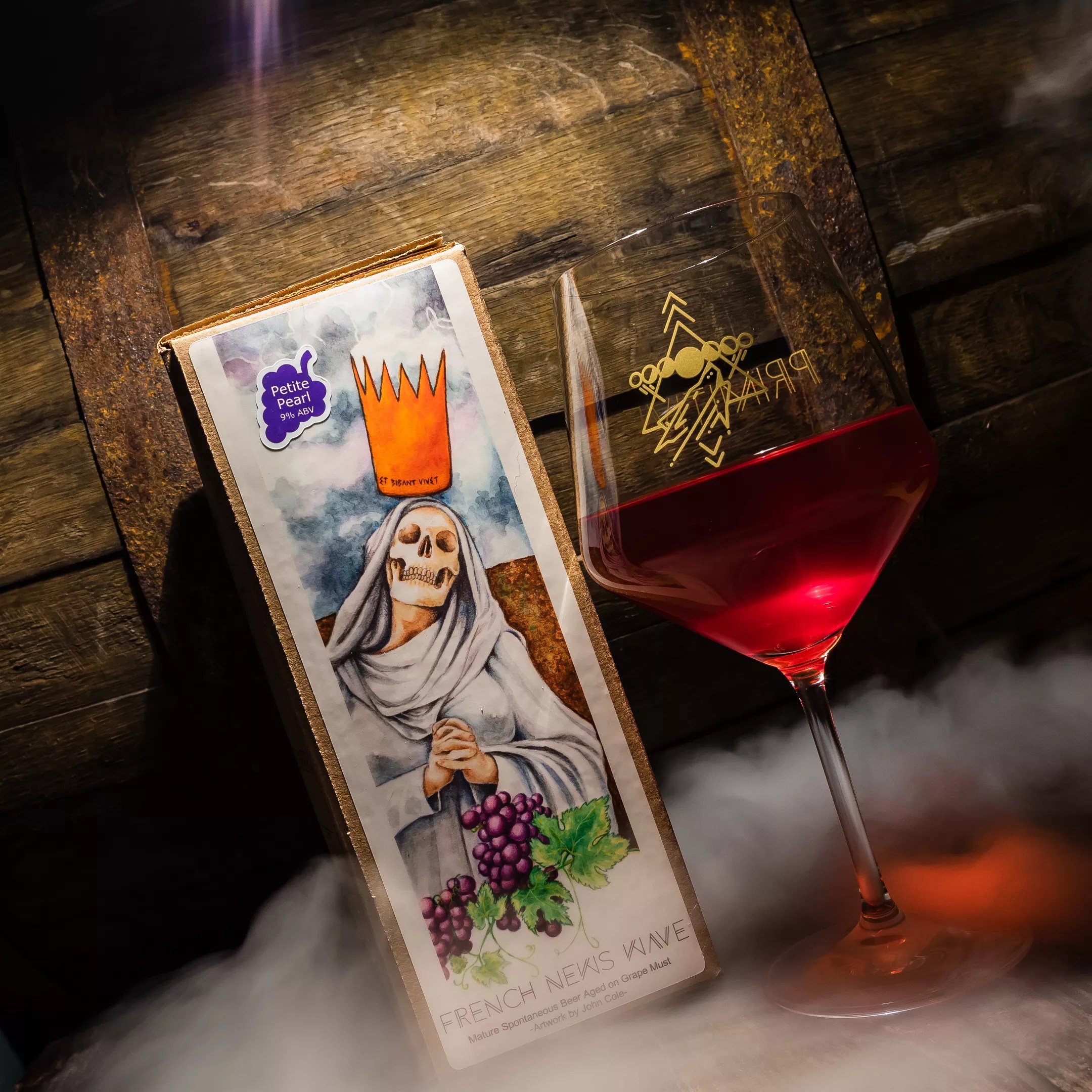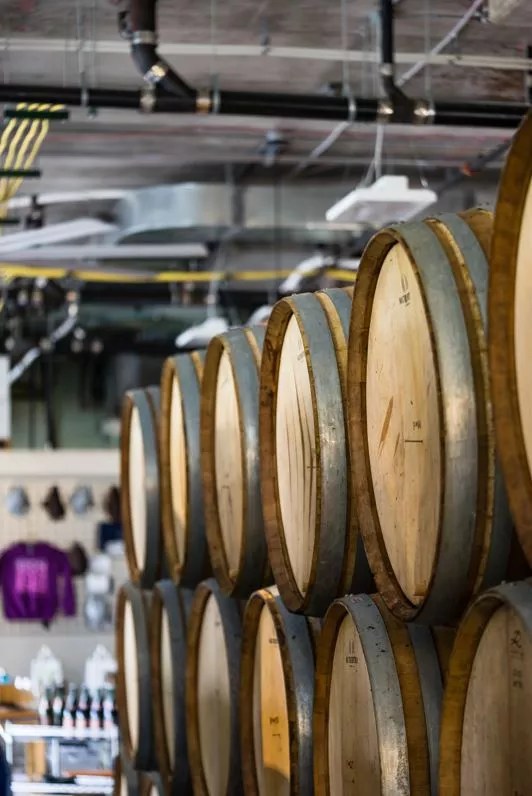
Matt Peck @hopternal

Audio By Carbonatix
The process for making a beer at Primitive Beer in Longmont is lengthy and challenging. In fact, it doesn’t even start in Longmont. Head brewer Brandon Boldt, who runs Primitive with his wife, Lisa, begins by driving to another brewhouse in the Denver area, where he’ll spend anywhere from four hours to three days brewing the batch before transferring the wort, or unfermented beer, to a converted tanker truck.
The beer is then brought back to the Longmont facility, where it chills in the koelschip (aka coolship), a large, shallow vessel custom-built to cool the wort and inoculate it with the wild yeast that occurs spontaneously in the air. After chilling, the beer is transferred into puncheon barrels, which at 132 gallons each are a little more than double the capacity of a typical wine barrel. There the beers will rest, usually for at least a year, and sometimes upwards of three years, until they’re blended with other barrels or, occasionally, left as single-batch vintages.
The process is especially complex, but every step has a purpose, and the Boldts wouldn’t have it any other way.
The couple got serious about starting a brewery in the summer of 2015. “[It was] July 5th, Brandon’s birthday,” Lisa remembers. “A blending project was the original idea; everything would pass through a barrel. And then we [narrowed in] on only spontaneous beer.”

The spontaneous beer is aged in puncheons, which are oversized wine barrels, usually around 132 gallons.
Matt Peck @hopternal
The Boldts, who both worked at Lafayette’s Odd 13 when the idea for Primitive began, have spent a lot of time immersing themselves in Belgian culture with trips overseas. They were inspired by different facets of Belgian lambic breweries but carved out a unique take of their own, eventually settling on only using Colorado ingredients, like Antero wheat grown just east of the brewery, local malts from Troubadour Maltings in Fort Collins, aged hops from the Western Slope, and fruit grown all over Colorado.
The couple also decided to make beer that is 100 percent spontaneously fermented. Instead of calling it lambic, as the Belgians do, they use the Méthode Traditionnelle (MT) label, a designation that refers to beers brewed outside the traditional region in Belgium but in accordance with the same guidelines. The MT designation is a nod of respect to the breweries that have been making spontaneous beers for decades, sometimes centuries. “We’re not going to call it lambic, because we fully respect and believe that name belongs over there [in Belgium],” explains Lisa.
Prior to the brewery’s opening in 2018, some people questioned whether breweries outside of Belgium could reliably make spontaneous beer that would match the quality of the Belgian mainstays. “There was a little bit of [motivation] because people said it couldn’t be done,” Lisa notes. “‘You can only brew it in this region, it’s in the air, it’s nowhere else.'”
“Challenge accepted,” Brandon quips.

After opening, Primitive quickly became known for its boxed beer, served still.
Matt Peck @hopternal
Primitive immediately made its mark, both in terms of the high quality of the beer right from the start and the way it was presented. The beer was initially served fairly warm and uncarbonated (still) from bags inside boxes. This is a traditional format within spontaneous-beer culture, but it wasn’t immediately appealing to everybody. Despite the pushback, however, the Boldts admit that they were fairly uncompromising early on. “We were more rigid. It was a tough sell,” says Lisa.
“If you don’t like it, it’s totally fine, but this is what we do,” adds Brandon.
The pandemic changed things, though, and the Boldts became more open to compromise, adapting to what they felt was needed locally. “During quarantine, we were jonesing to have people come back in a communal setting,” says Brandon. “Being able to facilitate what the community might need – which is to have a bunch of different types of beers available, as well as to showcase what we make.”
Now Primitive has Cohesion’s Czech-inspired lagers on the side pull, Hogshead’s English-style beers on cask and local IPAs on tap. “It’s the advantage of being in Colorado, where we have the best beer,” Lisa says.
Brandon points toward compromise as usually requiring both sides to “lose” in some way, but the changes that Primitive made as a result of the pandemic have been well received and feel more like a win for both the brewery and its customers. “I don’t feel like we’ve lost any part of our identity. We started as beer lovers, not beer makers, so when we choose beers to put on tap, it’s beers that we’re drinking, too,” he explains.

Primitive now packages its beers in bottles, as well.
Matt Peck @hopternal
The menu is representative of Colorado’s growing market of niche breweries that specialize in producing a distinct style of beer at a very high level, with little to nothing else being made, and Primitive is front and center in that movement.
Besides its own beers, which have expanded to include carbonated beer on draft and in bottles, Primitive also stocks vintage barleywines from England and an admirable selection of authentic Belgian lambics, many of which are not easy to find in the U.S., let alone Colorado.
Primitive is also looking ahead, with plans to add a brewhouse of its own on site. “We’d love to be the brewer of the wort and inoculate it in the koelschip, then give it to other people, who would be blenders,” Lisa says. They’d have their own barrels, fruit, packaging. That way, they could open up with lower costs, like we did, with no brewery.”
Along with its future plans, Primitive is actively working in the present to reduce its environmental footprint and minimize waste. The nature of spontaneous fermentations means that, compared to a traditional brewery, a larger percentage of beer will be unusable. So Primitive teamed up with Dry Land Distillers, which is also located in Longmont, because an undesirable batch of spontaneous beer works perfectly fine to make a whiskey. “We both use the same local heirloom grains, so [it felt natural] to make a whiskey,” Lisa says. The barrel used to age the whiskey was then used for a future Primitive beer, bringing the project full circle.

The custom koelschip at Primitive Beer is the first place the wort becomes inoculated with the microflora from the air.
Primitive Beer/Instagram
The brewery hopes to start a vinegar project for beers that are too acetic, since there’s nothing wrong with using those for cooking, cleaning and other non-drinking projects.
Primitive is also rescuing fruit. Outside of collaborations, rescuing fruit is the only other compromise the Boldts are willing to make to the brewery’s Colorado-only approach to beer. “Our fruit broker will occasionally reach out to us with a pallet of [high-quality] fruit,” says Lisa. “There’s nothing wrong with the fruit, but a grocery store may have rejected it. He will offer it to us at a good price, or he’ll take it to the landfill. The amount of work that goes into growing, producing and transporting the fruit is so much.”
This has led to Primitive’s Exercise in Fruitility series. The Raspberry variant was made with organic rescued fruit from Mexico, while the Blueberry variant used organic rescued Chilean berries. “We plan to continue to use rescued fruit in these beers until markets get better at supply chain and there are never any fruits going into dumpsters,” notes Brandon. “So probably not any time soon.”
The beer marketplace may be ever-changing, but within a very specialized part of the beer world, Primitive will always stay true to its roots and the culture that inspired it.
Primitive Beer is located at 2025 Ionosphere Street in Longmont and is open from 4 to 8 p.m. Friday and noon to 6 p.m. Saturday and Sunday. For more information, visit primitive.beer.